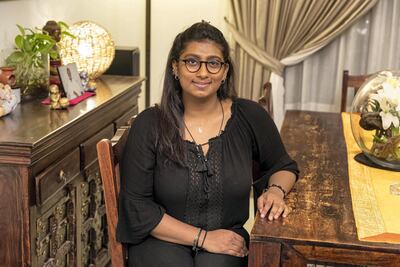Far from a spendthrift generation living only for the moment, Generation Z’s 18- to 24-year-olds appear to have been shaped by the global financial crisis into conscientious long-term savers.
Some 60 per cent of Generation Z are more concerned with saving than enjoying today and taking gap years, according to a global survey of almost 44,000 members of the cohort by UK- based data analytics company GlobalData.
It lays the blame — or credit — for Generation Z’s heightened concerns about the future on rocketing property prices, a scarcity of well-paid jobs, greater job insecurity and rapidly increasing educational costs.
This centennial generation does not remember a time before the internet or social media and grew up watching its elders struggling with the global recession 12 years ago.
As an only child born in Oman, Indian student Vani Thampi, 22, says she never had to save before — but that it is a focus for her today.
Ms Thampi, who has lived in Dubai since she was eight, is studying psychology at Stony Brook University in New York.
“Lots of friends make fun as it is a habit for them, but my parents have provided pretty much anything I’ve ever asked for,” she says. “I never really had to save growing up. It’s not a practice I’m used to but it’s important for kids my age to save, to not have anything weighing you down."
Money spent, Ms Thampi has realised, is money gone. “It’s no more yours and it is a hard lesson learned for me,” she says.
Luckily, unlike many classmates in the US, she has never needed hefty student loans so she knows she will not be loaded down with debt when she graduates. But it is not just students with loans that she knows who are saving, but those from financially secure backgrounds too.
“We are seeing a future we may not have seen before,” she says. “Even my parents’ generation are looking for financial stability in today’s world.”
GlobalData also found that half of Generation Z are keen to receive expert financial advice. This means, it says, that banks should be catering to the younger demographic and providing savings tools rather than credit cards.
One bank looking to do that is Liv., Emirates NBD’s mobile-only banking app, launched in 2017. Jayesh Patel, head of Liv., says it is “urban legend” that younger folks just spend “every dime” of the money they get.
The bank claims it is breaking the traditional banking mould to give its 300,000 customers a “healthy financial life”. Free for the under-24s, it pays 2 per cent interest on balances.
Liv. users can set up Goal Accounts for their savings and budget for each specific goal, such as Dh2,000 for a holiday. Mr Patel says just under a third of the bank’s customers are of Generation Z age, setting over half of the bank's goals, with the average at Dh1,500.
“This generation save for a rainy day,” he says. “They are not just saving for a brand-new iPhone or a skydiving trip but for the longer term. It’s great — especially in a consumer-driven economy — that they have such an awareness of saving.”

This summer Ms Thampi saved Dh600 from an internship at Emirates Airline, as well as money she was given as gifts from family members. She keeps her money in cash in the family safe as an emergency fund.
However, even at 22, she is looking ahead even beyond graduation in 2020 when she plans to move into a shared apartment, before settling down and having children.
She plans to save for all those major life events and hopes to save a third of her salary, once she has one. The dream, she says, is a “good paying job”.
Mr Patel says travel is one of the biggest goals set in Liv., with a quarter of Generation Z customers setting that as their target.
The post-millennials are also least likely to have any debt at all, according to the UK’s Financial Conduct Authority, including overdrafts, credit cards or loans. In May it published its first report on intergenerational differences, finding that one in 10 adults had no savings at all and that Generation Z will struggle more with putting money aside for future generations than baby boomers.
Sam McKiddie, 20, a British third-year student of economics and finance at the University of Glasgow, who spent a month in Dubai this summer doing an internship at investing platform Sarwa, says he does not consider himself a spender or a saver. He is willing to spend money on travel and experiences but doesn’t like “to throw money away”. “My mum thinks I like to spend yet also says I’m frugal,” he laughs.
“I don’t want to live pay cheque by pay cheque and going into overdrafts but I also don’t want to have all this money saved up without enjoying my teens and twenties. So I save on things like food, clothes and transport but spend on bigger, fun activities.”
He makes around £400 (Dh1,834) a month from part-time jobs as a lifeguard and swimming coach and saves around £1,500 a year. Two years ago he spent £1,000 travelling around Europe by train for three weeks, and is now consciously saving for accommodation and a car for when he graduates in two years.
“When the last [financial] crash happened, I was nine. So it’s different to previous generations; I think we are more aware of saving," says Mr McKiddie. "Last year I went on holiday but then found out I had to come back urgently; I had to reschedule a flight to Canada at a cost of £300. It was annoying but, because I had been saving throughout the year, I was able to find the money.”
Generation Z grew up watching their parents struggle through a recession and its aftermath, says Steve Cronin of UAE financial community DeadSimpleSaving.com, and it would have made "a strong impression".
“They saw their parents losing jobs, making difficult spending decisions and having to budget to survive, " he says. "They are conscious that the world is an increasingly competitive place with few free lunches, where they are going to have to work hard."
This natural frugality, he adds, leads to a higher savings rate.
"In a world where buying your first home seems almost unachievable, wasting your money on parties and designer clothes isn’t so attractive anymore," says Mr Cronin.
But forget Generation Z being the biggest savers - the next generation, dubbed Generation Alpha (the first group of children born to millennials, from 2011) is even more financially savvy, says Ms Thampi.
“Kids today are definitely very money-conscious, more than I was at 15 or 16," she says. "They are aware of their financial status, and their parents are making them more aware of handling finances.”
It has been both a boon and a bane to have grown up less financially aware, she says. “As a kid, I was allowed to be one. I was free to do what I wanted and didn’t have to worry about money,” she says. “But at 22 I feel a bit lost in terms of finances."

